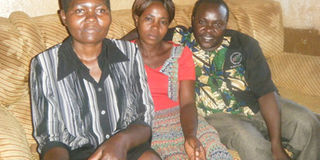Mentally ill mother struggles find balance HIV treatment

Left to right: Ms Joy Namusoke, the caretaker of Victo Namugaya (centre) and Dr Emmanuel Mufumba, the Jinja District focal person for mental health, at the patient’s home in Mutekanga Ward, Bugembe Town Council, recently. PHOTO BY RICHARD MUZAALE
What you need to know:
- Mental illness among women, according to the executive director of Butabika hospital, Dr David Basangwa, is triggered mostly by pregnancy and childbirth, domestic violence, loss of a job or loved one. The signs and symptoms of mental illness manifest in various forms and differ from one person to another, according to Mr Kizza Derrick Mbuga, the executive director of Mental Health Uganda, a patients’ rights group.
- As such, its early manifestations may be hard for the inexperienced to detect. Mr Mbuga lists unbearable anxiety, self-isolation or withdrawal attitudes, suicidal or violent tendencies, loss of appetite and change in sleeping patterns plus amnesia, among the symptoms.
Jinja. Last Friday, Uganda joined the rest of the World to commemorate the Mental Health Day.
However, the celebration went unnoticed for Ms Victo Namugaya, 35, who is coping with HIV/Aids and mental illness.
Namugaya, a resident of Mutekanga Ward in Bugembe Town Council, Jinja District, was married to a mentally ill person, Mr Moses Igadira Tenywa. From that relationship, she bore a child, Resty Bikobere.
Namugaya later separated from Tenywa and eloped with another man with whom she had two children: Zainah Tibitondwa, 9, and Christopher Magada. Their father has since died.
Her life took another downturn when people, still at large, kidnapped Magada at Wanyama Trading Centre in 2010. To-date, the whereabouts of her child remain unknown.
The Kiira Division police spokesperson, Ms Diana Nandaula, at the weekend said the Criminal Investigation and Intelligence Department is still conducting investigations into Magada’s disappearance.
Ms Nandaula requested Namugaya or any of her relatives to furnish her with the reference number to ease follow-up.
Due to her child’s disappearance, Namugaya also suffers from high levels of stress and depression. This is evident as she can hardly speak.
Nevertheless, the 35-year-old is determined to put her health predicament behind her. Today, she has found solace at home, with her family.
“Mental illness interrupted my [HIV/Aids] treatment regimen and this worries me so much,” Namugaya, who has been on treatment since 2008, says.
She adds: “I am currently struggling to cope with the combination of HIV/Aids and mental illness [drugs] and side effects such as nausea, dizziness and strange dreams.”
She is currently receiving free mental illness treatment from Uganda Mental Health Fellowship - Atanekontola, an association of people living with mental illness in Busoga region based at Bugembe Health Centre IV.
Symptoms
According to Dr Emmanuel Mufumba, the Jinja focal person for mental health, neurological disorders and drug subsistence use affect the functioning of the nerves of the brain.
He says people suffering from mental illness are at risk of being infected with HIV/Aids because some people take advantage of their situation by raping and defiling them.
Dr Mufumba also says mental illness can be genetic and infectious through brain defects or injury, prenatal damage, stress, depression, poor nutrition and exposure to toxins such as lead.
According to Dr Mufumba, Jinja hospital requires drugs such as Chlorpromazine, Carbamazepine, Fluoxetine, Trihexyphenidyl, Folic Acid and Phenytoin.
He urges the government and donors like Global Fund to double the annual budget for HIV/Aids and mental illness drugs in Uganda from the current Shs90 billion.
Mr Johnson Tibamwenda, a counsellor at the health facility, says some people living with HIV/Aids find it difficult to follow their timetable to swallow drugs.
Ms Joy Namusoke, Namugaya’s caretaker, says Namugaya was bedridden early this year and had stopped taking her antiretroviral (ARV) drugs. Consequently, her health deteriorated.
“It is until I went to Bugembe Health Centre IV and traced her file number that I got her tested [for viral load], she got her drugs and improved,” Ms Namusoke says. This is confirmed by Mr Yusuf Mbaizweli, a clinical officer at the health facility.
According to a Joint United Nations Programme on HIV/Aids report, 900,000 patients are on antiretroviral treatment and Mother-to-child infections now stand at 3,500 infections annually.
The Jinja health services annual health sector performance report showed a 0.7 per cent decline in HIV prevalence from 5.1 per cent in FY 2012/2013 to 4.4 per cent in FY 2013/2014.
The psychiatric unit of Jinja Regional Referral Hospital recently suffered shortages of mental health drugs putting patients in Busoga sub-region at risk while exposing others to self-inflicted injuries as a result of shortage of drugs.
“As mental health workers, we are going to have a discussion with the National Medical Stores to have issues around distribution of mental health drugs addressed because Jinja is under-stocked,” he says.
The in-charge of the mental health unit, Ms Edith Alitwala, says the unit receives between 500 to 600 mental health patients monthly. Amid such adversity and helplessness, Namugaya is still optimistic.
“At first, I used to default on my medication but after adhering to it, my health has improved because I now take the drugs as recommended by the doctor and caretaker. I no longer feel lonely and isolated.
“Hospice Uganda, Jinja branch has helped me a lot with all the necessary support ranging from emotional to beyond counselling. My only request is for my children to get decent education; because in my current state, I can’t do much and my husband equally suffers from mental illness and HIV/Aids,” she adds.
[email protected]



